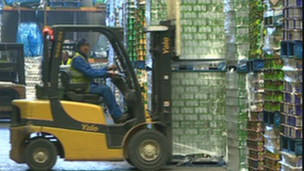Welsh economy: 'Forgotten army' of medium companies
- Published
BBC Wales business correspondent Nick Servini: Should Wales grow medium-sized firms?
An enormous amount of money and effort has gone into attracting foreign jobs to Wales, while at the other end of the spectrum, huge work has gone into trying to turn generations of school leavers into entrepreneurs.
It is fair to say there have been mixed results with both in recent years.
But there is another way which could be more effective, and that is focusing on growing the existing stock of what the Confederation of British Industry (CBI) calls the "forgotten army" of medium-sized companies.
As one senior corporate lawyer put it to me, "adding a zero to the turnover" of these firms could have a potentially transformative effect on parts of the Welsh economy.
So who are these firms and how does Wales perform?
There are 2,000 companies in Wales with between 50 and 249 staff, employing in total about 128,000 people. It works out at just 1% of the companies in Wales yet it makes up 12% of the workforce.
Last year, Dylan Jones-Evans at the University of Wales Global Academy carried out research on businesses of this size, and at the time he said: "More detailed statistics show that the potential of this sector has yet to be realised in Wales compared to the rest of the UK.
"For example, if Welsh medium-sized firms had the same average employment and turnover as their UK equivalents, they would generate an additional 65,000 jobs and £9.5bn into the Welsh economy."
So what's the problem? One issue is that a significant number of firms appear to sell up once they get to a certain size of turnover.
The corporate finance specialists Gambit studied the disposal of owner-managed companies in Wales for the five year period up to 2010.
The findings seem to back this up with three-quarters being sold when they had a turnover of less than £10m a year and a quarter before they were five years old.
Frank Holmes, a partner at Gambit, says: "It's not necessarily a problem if the new owner wants to expand by growing and investing in the Welsh acquisition but it can be a missed opportunity if a Welsh company is snapped up by a rival firm or financial investor and relocated when that business could be built up by incentivised management with ambition, thus protecting stakeholders' interests and supply chains in Wales."
Management buy-out
There are a number of ways in which a company can grow without being sold to a competitor.
It can expand organically through its existing workforce via a management buy-out.

Cambrian Foods currently employs 100 people in Carmarthenshire
This is where some of the senior staff raise enough cash to buy out the owners and then take the business where they want it to go, which will also mean spending money if expansion is involved.
One of the barriers to deals like these is the lack of equity finance to help grow a company, which is where investment companies provide the finance for the expansion by paying for a stake in the ownership of a company.
The Welsh government's investment bank, Finance Wales, does this for up to £2m but experts say it can be difficult to tempt investment companies in London to take a look at Welsh firms for investments under £10m, meaning there's a gap in the funding to take companies to the next level.
There can also be a lack of ambition shown by the companies themselves, particularly if the owners are reaching retirement.
New production line
Rob Cherry, from the law firm Morgan Cole, specialises in putting together corporate deals in Wales. He believes management buy-outs will become increasingly important as a generation of company owners look to end their careers.
He said: "It's a feature of how the private sector as it currently stands in Wales has evolved, particularly in manufacturing.
"It evolved from the baby boomer generation. These are owner-managers who started the business, probably after having been made redundant from heavy industry.
"They have built companies very nicely to a certain size but they are not naturally entrepreneurial, in the sense that they are not naturally given to risk, and growing very fast.
"That generation of owner managers are not going to provide the mid-sized companies that we're talking about and we need to concentrate on those that are."
There are cases where a sale can be good for the business, provided the new owner wants to expand it.
A good example of this is Cambrian Foods, a pet food manufacturer in Carmarthenshire. The Davies family who owned it sold a majority stake to a Californian investment company in a multi-million pound deal last year.
The family still own a third and are still running the business, which employs 100 people locally.
The Americans bought it to grow the business from its base in Wales so the company now has a war chest thanks to the investors and it is looking to buy up other firms and possibly start up a new production line in Carmarthenshire.
All of this may appear remote from the economic realities of most people's day to day lives in Wales but what we're talking about here is whether a promising company on an industrial estate or a business park near them is willing or able to buy the machinery for a new production line which will require 20 or 30 new workers.